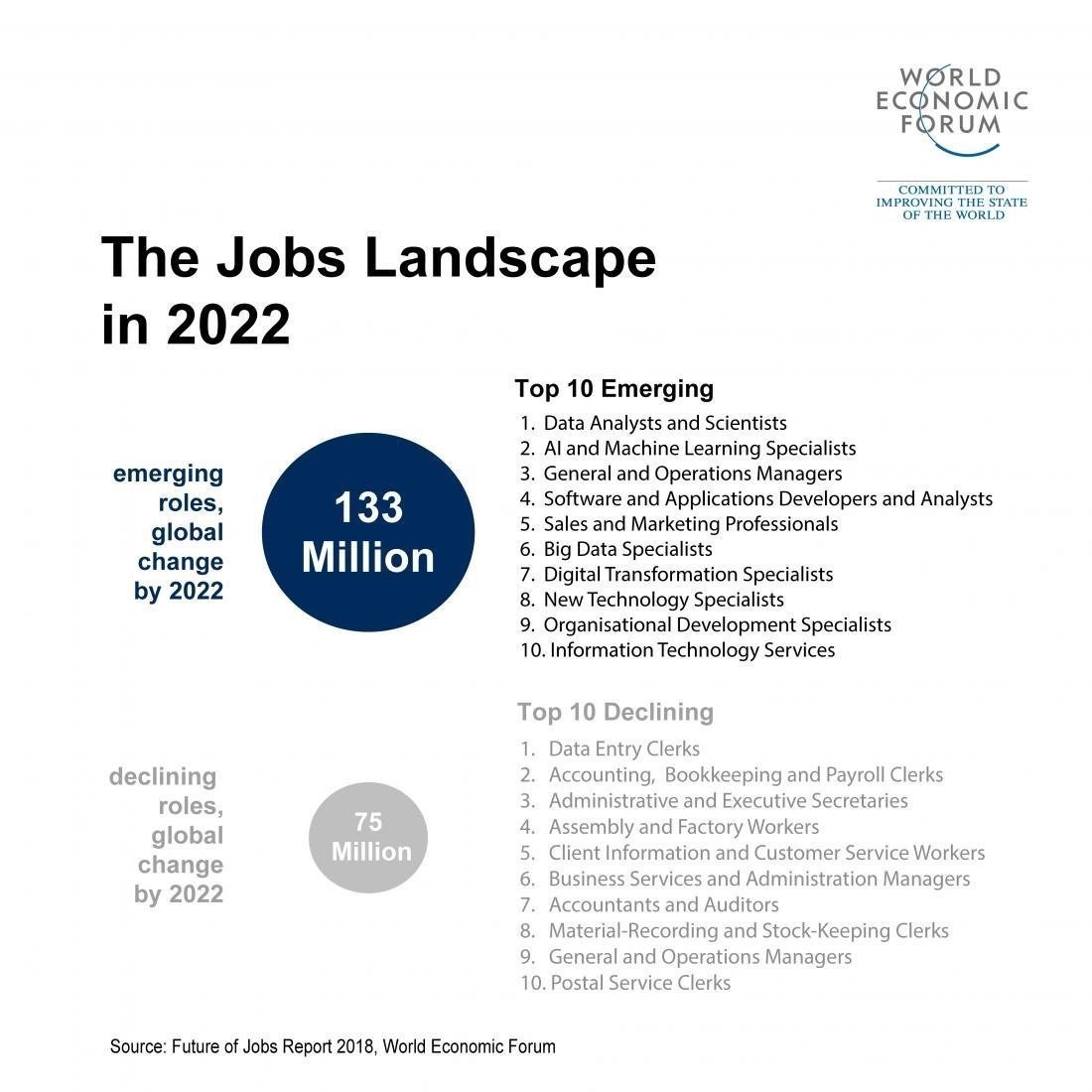The Day the Robots Stole Your Job. Adapting & Creating our Jobs in the Age of Artificial Intelligence.

CAN A ROBOT TAKE MY JOB? Yes, there is no doubt automation destroys jobs. However, job losses are temporary. Indeed, temporary job losses often result from innovation. It is only natural to anticipate layoffs when new technology is introduced but the good news is that jobs that remain are often better paid and new better jobs are created. Robots and AI are changing completely the way companies compete in the market, the way they produce and how they approach different clients.
SO, HOW CAN COMPANIES INNOVATE? Where we are going, good enough is dead. We are in a world where everything is equally excellent, we are in a world fueled by digitization, mobilization, augmentation, disintermediation, automation. In this situation, there is only one space left to innovate, you. Indeed, the way we work will never be the same, how do you want to react to all of this? Are we driving the change, or are we driven by it? Yes, robot and AI will do some of our work, but this will allow us to focus on things that cannot be automated. In the future, companies need to learn just in time and not just in case and be as fast as possible in implementing the changes before the competitors. Security means having more access to opportunities and having more capabilities to translate opportunities into income using technology.
WHAT ABOUT YOU & ME? WILL WE BE SUPER HUMAN WITHIN THE NEXT 5-10 YEARS?
Job displacement and job creation Technology deployment is limited by how fast workers can be train for it. For sure we will be enhanced by technology and we will be able to complete task that were impossible in the past. For example, private companies are already making exoskeletons for civilians and has helped those with disabilities or paralysis to walk again and others integrates motors and springs into soft leggings that augment the work performed by the legs. Or ocular upgrades are one of the most exciting areas of Bionic advancements, with numerous labs working on contact lenses that offer the wearer anything from telescopic vision to a built-in computer screen. But those are just examples, the possibilities are unlimited.
WHICH PART OF YOUR BRAIN SHOULD YOU DEVELOP?
Humans should develop the right part of their brains, the creative and artistic one. Why? Because creativity, empathy, social perceptiveness, negotiation & persuasion are all skills that cannot be replaced by a machine. Instead it is pretty common to replace a human being doing calculations with a machine, we cannot compete with machine for calculations. Companies will need a lot more profiles with technical skills able to handle technologies properly plus those soft skills.
HOW JOB WILL EVOLVES BECAUSE OF AI?
Nature of jobs over time will evolve in more non-routine cognitive compared to routine cognitive that will be done by machines instead. We will have less routine manual and more non routine manual jobs. Routine tasks indeed can easily be replaced by AI and robots. It is hard to do the same instead for non routine tasks. Jobs will recompose every 6 months with new elements that cannot be automated. Plus in the future 30-50% of total workforce will be comprised of non-employees and we will assist at the Uberization of jobs. Work will become means of dignification instead of survival. The good news is that people will have more time for creativity, innovation and learning.
How companies will evolve because of robot?
Well, there are many different faces of the robot revolution depending also on the industry. For example, the overall adoption among companies by 2022 of humanoid robots will be 23%, of stationary robots will be 37%, of aerial and underwater robots will be 19%, non humanoid land robots will be 33%. But if we consider first movers and different industries the % will significantly increase. For example the rate of adoption for humanoid robots will be 35% for financial services and investors, use of stationary robots will be 53% in automotive, aerospace and supply chain, use of aerial and underwater robots will be 52% in oil and gas, non humanoid land robots will be 42% in automotive, aerospace and supply chain.
How can a company win the market?
If companies want to be competitive they need to automate repetitive task. How? If currently there is something done manually there are two different approaches. An innovative geek company will get annoyed, will write script to automate, or buy it in outsourcing, and then it will run the script and will win in the long run. A traditional company will continue to do it manually, will make fun of geek’s complicated methods, will not train the employees with the new available technology, will spend less in investment in the short run but it will lose efficiency, competitiveness and money in the long run.
How the job landscape will look like in 2022?
According to the world economic forum, the job landscape in 2022 will show top 10 emerging and top 10 declining roles. The good news is that the emerging roles will be 133 Million and the declining roles will be 75 Million. It means that the advancement of robotics and artificial intelligence will make 75 million jobs obsolete by the year 2022, according to their report. Sounds dreadful, but the same report goes on to predict the creation of 133 million new jobs over the same period, for a net increase of 58 million jobs.
What are the top 10 emerging roles? And what are the 10 ten declining roles?

What about Interdependency of AI adoption and Labor market mismatch? What types of skills will your company need?
As mentioned earlier, the most important skills are mostly related to capabilities that cannot be automated. Crucial will be complex problem solving, critical thinking and creativity. And of course people management will play an important role, especially with the new emerging smart-working solutions where coordinating with others may seem to be more difficult. Emotional intelligence, judgment and decision making will also play a very important role in the new job landscape as well as service orientation and negotiation. The last one is cognitive flexibility. We found there was a very clear, strong reverse trend between the creative content of a job and its probability of computerisation and replacement by robots.
To sum up
- Automation destroys jobs but creates better ones.
- We need to reinvent ourselves constantly, to become more creative and more empathetic.
- Automation generates tons of reliable data, which needs to be transformed into actionable insights.
- We can focus on how to build better experiences for all key stakeholders.
- This will make all of us employable for life.
This article was first published in Agenda Digitale.
About the authors: Prof. Christopher Abraham:
Professor Christopher Abraham is the Professor and Head of Campus (Dubai) at SP Jain School of Global Management. A permanent resident of Canada with three Post Graduate degrees in Business Administration, HRM (Marketing) and Labour & Administrative Law and a PhD scholar in Positive Psychology, he is a Certified Design Thinker from IDEO/Stanford and has 32 years’ experience in management consulting, marketing, and management education in India, Canada, Singapore, and the UAE.

Dr. Silvia Vianello
Dr. Silvia Vianello is the Associate Professor & Director of Innovation Lab at SP Jain School of Global Management. She has over 15 years of Teaching, Consulting and Managing experience. She has a PhD in Economics and Organization and a Master’s Degree in Business Administration with Specialization in Marketing and Technology. She has been recognised by Forbes as one of the Top 100 Most Successful Italian Women in the World.
Click Here, to read more articles on Artificial Intelligence.

